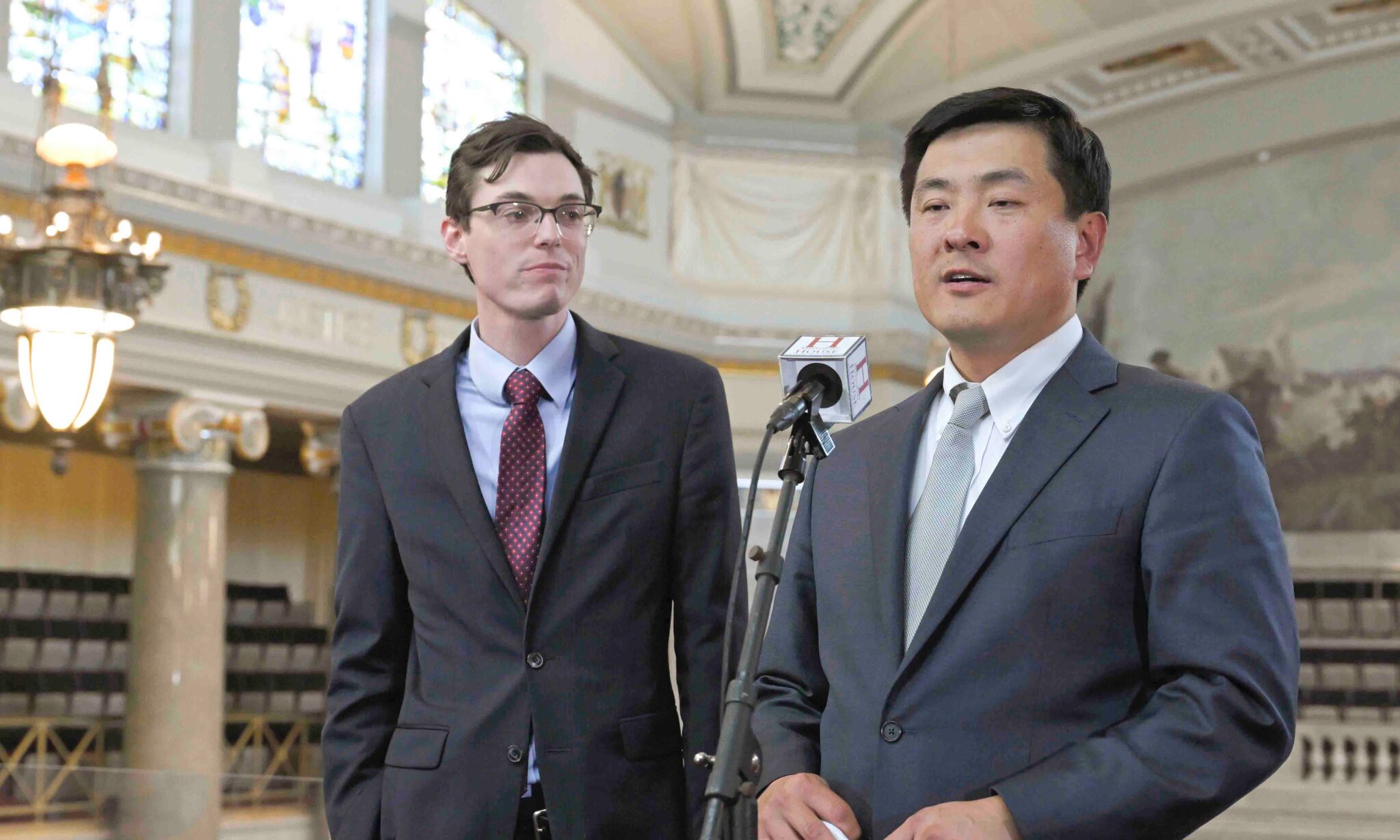Missouri House Republicans surprise Senate by killing $500 million construction bill

Missouri House Republicans unexpectedly refused to allow a vote Friday on a $513 million spending bill for construction projects, citing a desire to control spending for a move that was kept secret from Democrats in the chamber and members of the state Senate.
The move sank funding for major projects around the state, including national guard facilities, Boys and Girls clubs, and community health centers, to name a few. And it could seriously damage relations within the House and between chambers.
Up to the moment the House adjourned without passing the bill, this year’s process for deciding the budget had resembled years in the past where even major disagreements over spending priorities was resolved in time to meet the Constitution’s deadline for passing appropriation bills.
House and Senate conference committees hammered out the details of the $49.8 billion budget for day-to-day operations over two days of meetings this week. Last year, no public negotiations at all occurred because factional Republican warfare in the Senate delayed spending bills in that chamber.
The major new spending items in the operating bills going to Kehoe’s desk include:
- A $300 million increase for the foundation formula, the state’s basic aid program for public schools.
- $107 million to revamp the child care payment system so providers receive their money at the beginning of each month for the children enrolled in their center.
- $50 million to expand the number of children served by the MOScholars program, which helps parents pay tuition at private and parochial schools.
- A state employee pay raise plan based on longevity, with raises up to 10%, plus pay increases for Department of Corrections officers who work in high-security and administrative segregation areas.
Only once, since the early deadline for spending bills was enacted in 1988, have lawmakers failed to pass any of the operating budget bills. Failure to enact those bills means they must meet in special session before the fiscal year begins on July 1.
There is no similar urgency for the construction bill, except for the organizations and agencies planning the projects it would fund. Gov. Mike Kehoe could call a special session to consider construction spending or let the projects wait a year to receive money.
There was no advance notice that the capital projects bill would not receive a vote. The final votes on the 13 operating budget bills came, for the most part, rapid fire. Only the bill that included the $50 million for the MOScholars program received extended debate in the House and it passed by the narrowest margin, 84-55, on a roll call that required 82 votes to pass.
Along with the operating budget bills, three capital appropriation bills were pending when the day began. One bill authorized $171 million for maintenance and repair needs, the second allocated $513 million to new construction and a third bill has $2.6 billion of state and federal tax money to continue projects first included two years ago.
The Senate voted on the capital appropriation bills first as it waited for word that the House had passed several of the operating bills. The Senate voted on each bill as it arrived from the House, sending the entire set to Kehoe’s desk.
The Senate was already adjourned for the day when the House finally debated the maintenance and repair funding and the bill to continue ongoing projects late Friday afternoon, just hours before the constitutional deadline.
Only when the House itself adjourned without taking up the construction bill was it clear that the bill would die. The Constitution forbids lawmakers to consider spending bills in the final week of their regular session.
House Budget Committee Chairman Dirk Deaton, a Noel Republican, said at a news conference that he made the decision after consultation with House Speaker Jon Patterson of Lee’s Summit and Majority Leader Alex Riley of Springfield. He said he did not inform Senate Appropriations Committee Chairman Lincoln Hough, a Springfield Republican, of his decision. House Democrats said they were not told, either.
It was a purely financial decision, Deaton said. The House-passed budget, he said, projected the state would use about $600 million of what the governor’s budget plan projected will be a $2.5 billion unencumbered general revenue surplus at the end of the current year. Kehoe’s budget used about $1.1 billion of the surplus, but when the operating budget negotiations ended, the projection showed that about $1.6 billion would be spent.
During negotiations on the nearly 600 budget lines with differences between the House and Senate, Hough held the Senate position on more than 350, while the House version was chosen about 185 times. For several dozen, a compromise amount between the chambers was included.
On the majority of lines where differences occurred, the conference committee chose the higher spending amount.
“We had many things in there that we thought were good and worthy of doing and would have liked to have seen done,” Deaton said. “But considering what we spent in the operating (budget), I just felt like we couldn’t move forward at this time.”
The decision to shelve the construction bill was not because the House perceived it had lost in budget negotiations, Patterson said.
“We don’t think about Senate positions and House positions,” he said. “We think about positions from Missouri, I think probably had more to do with we sent them the bill on the 17th and then we received the bill back with about six hours left.”
Lawmakers have one more week before the session ends. There are major bills awaiting final action, including GOP priorities to roll back the abortion rights and the sick leave law approved by voters in November.
Patterson said he didn’t see any reason why refusing to vote on the construction bill would change whether those other bills pass.
“I have nothing but great things to say about how the Senate has been working this year,” he said. “I think they’ll continue to work like that.”
After passing the operating budget, the House recessed and Republicans met in caucus. That is when the decision was made, Deaton said.
“They had great concerns that I would try to be fair to them and not ask them to have to vote on something that they hadn’t had an opportunity to review and have input on,” Deaton said.
The action hurts communities across the state that were anticipating projects that ranged from hospitals and new National Guard facilities to major research buildings, said state Rep. Betsy Fogle of Springfield, the ranking Democrat on the House Budget Committee.
“My members and I worked very hard to fund vital services to Missourians in House Bill 19,” Fogle said. “I would like to deliver the promise and the effort that we made. And I know a lot of the majority party feels the same way. Looking through this list, there were members that worked very hard to bring dollars back home to our communities.”
Hough confirmed in an interview with The Independent Friday eventing that he was not informed by Deaton that the bill would not receive a vote.
“Am I frustrated with them taking no action and essentially then killing the (capital improvements) bill? Absolutely.” Hough said. “That’s frustrating for everyone.”
The Independent tracks earmarks — special items added to the budget proposed by Kehoe — and of just over 300 in the budget, 60 were in the capital bill that did not pass. Of those 60, 42 were in the bill when the House approved it.
“Disproportionately, they hurt their own members,” Hough said. “The majority of the things in that bill were added for House members, so that just doesn’t make any sense.”
As proposed by Kehoe, the construction bill used about $139 million of general revenue and about $186 million of federal funds and other money. The projects included $50 million to support a new research reactor at the University of Missouri, $55 million for projects on the State Fairgrounds in Sedalia and $52 million for National Guard facilities.
In the House-passed version, the general revenue was bumped to $216 million and new projects included $20 million for a parking garage adjacent to a convention center in Jefferson City, $11 million for a redevelopment project in Cape Girardeau and $6.8 million for a hospital in Salem. The smallest project added in the House was $60,000 for a county maintenance building in Dallas County.
The Senate accepted all of those projects and added 18 more of its own, with items like $10 million for a community health center in Barry County, $8 million for Boys & Girls Clubs statewide and $1 million for improvements at an airport in Washington County.
Because of the tight timeline for passing budget bills and House rules that make conference meetings impossible when the deadline is near, Hough had anticipated that by keeping everything in the bill when he received it, the House would accept it.
He said at the Wednesday committee meeting that approved it that he had assurances from Deaton that was the case.
“The trust has been eroded with the lack of communication from the House,” Hough said.
Deaton said he had not given Hough any assurance that the package would be acceptable.
“There was never any agreement, and certainly not one that we would just take anything if our insertions were not taken out,” Deaton said.
House Democrats, who had praised Deaton for running a more bipartisan budget process where they received a share of the earmarked items, said the goodwill of that work has been damaged.
“What Rep. Fogle was mentioning,” said House Minority Leader Ashley Aune of Kansas City, “about having not been clued in that this was on the table for the majority party, is a huge breach of trust between the caucuses.”
GET THE MORNING HEADLINES.
Missouri Independent is part of States Newsroom, a nonprofit news network supported by grants and a coalition of donors as a 501c(3) public charity. Missouri Independent maintains editorial independence. Contact Editor Jason Hancock for questions: info@missouriindependent.com.
Miss Clipping Out Stories to Save for Later?
Click the Purchase Story button below to order a print of this story. We will print it for you on matte photo paper to keep forever.

